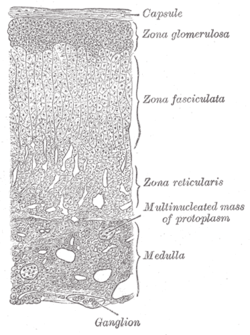Zona reticularis
| Zona reticularis | |
|---|---|
 Layers of cortex. | |
| Details | |
| Identifiers | |
| Latin | zona reticularis |
| MeSH | D015385 |
| FMA | 69236 |
| Anatomical terminology | |
The zona reticularis (sometimes, reticulate zone) is the innermost layer of the adrenal cortex, lying deep to the zona fasciculata and superficial to the adrenal medulla. The cells are arranged cords that project in different directions giving a net-like appearance (L. reticulum - net).[1]
Cells in the zona reticularis produce precursor androgens including dehydroepiandrosterone (DHEA) and androstenedione from cholesterol.[2] DHEA is further converted to DHEA-sulfate via a sulfotransferase, SULT2A1.[3] These precursors are not further converted in the adrenal cortex if the cells lack 17β-Hydroxysteroid dehydrogenase. Instead, they are released into the blood stream and taken up in the testicles and ovaries to produce testosterone and the estrogens respectively.
ACTH partially regulates adrenal androgen secretion,[4] also CRH.[5][6]
In humans, the reticularis layer does contain 17α-hydroxylase; this hydroxylates pregnenolone, which is then converted to cortisol by a mixed function oxidase. In rodents, the lack of 17α-hydroxylase results in the synthesis of corticosterone instead of cortisol as in the human.[citation needed]

References
[edit]- ^ Histology: A Text and Atlas, 5th ed. Ross and Pawlina.[page needed]
- ^ Wheater's Functional Histology, 5th ed. Young, Lowe, Stevens and Heath.[page needed]
- ^ Rainey WE, Nakamura Y (February 2008). "Regulation of the Adrenal Androgen Biosynthesis". J. Steroid Biochem. Mol. Biol. 108 (3–5): 281–6. doi:10.1016/j.jsbmb.2007.09.015. PMC 2699571. PMID 17945481.
- ^ Pediatric Adrenal Insufficiency (Addison Disease) at eMedicine
- ^ Ibáñez L, Potau N, Marcos MV, de Zegher F (September 1999). "Corticotropin-releasing hormone as adrenal androgen secretagogue". Pediatric Research. 46 (3): 351–3. doi:10.1203/00006450-199909000-00018. PMID 10473054.
- ^ Coppola, Christopher P.; Merrell, Ronald C. (2001). "Neoplasms of the Adrenal and Endocrine Pancreas in the Elderly". In Rosenthal, Ronnie A.; Zenilman, Michael E.; Katlic, Mark R. (eds.). Principles and Practice of Geriatric Surgery. Springer. pp. 301–21. doi:10.1007/978-1-4757-3432-4_22. ISBN 978-1-4757-3432-4.
External links
[edit]- Histology image: 14502loa – Histology Learning System at Boston University
- Anatomy Atlases – Microscopic Anatomy, plate 15.292 - "Adrenal Gland"
